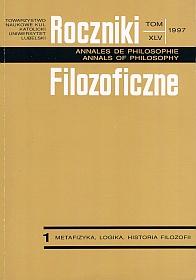Remarks on Some Types of Necessity
Abstract
The paper sought to answer the following question: what is a metaphysical necessity? What is a logical necessity?
The first part of the paper shows the genesis of the concept of necessity in Greek philosophy, as well as the types of contemporary theoretical knowledge. It is on the grounds of those types that propositions, in a sense necessary, appear or may appear. Basically, the first part shows necessities discussed in the general theory of being (classical metaphysics). It is in this theory that a necessary being is discussed (its essence is existence) and necessary relations which unite independent constitutive factors in one, concrete being.
In the second part of the paper the logical necessity has been discussed. It is emphasized here that theorems in logic, its laws, are necessary, for they state necessary relationships between the states of things. Their necessity is constituted by their appropriate structure. The logical necessity is a formal necessity. It has been stressed that to express the logical relations grasped in a cognitive manner we have special terms, functors, which are called logical constants. In the majority of laws of logic there are several logical constants, there are simple laws of logic of one logical constant. The representatives of all the types of theoretical knowledge (including the general theory of being), a knowledge we gain in the ontological research approach the actual founders of that knowledge take. The paper meant to characterize the formal necessity which is connected with the classical propositional calculus and traditional logic.
Copyright (c) 1997 Roczniki Filozoficzne

This work is licensed under a Creative Commons Attribution-NonCommercial-NoDerivatives 4.0 International License.





